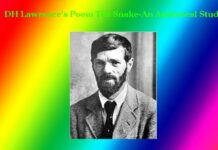Wilfred Owen | Dulce et Decorum Est | An Analytical Study
Wilfred Owen | Dulce et Decorum Est | An Analytical Study
Wilfred Owen | Dulce et Decorum Est | An Analytical Study
‘Dulce et Decorum Est’ is a poem by Wilfred Owen written on the theme of war. The title of the poem is borrowed from an ode of the famous Roman poet Horace. Literally, the title means, ‘It is pleasant and proper to die for one’s country.’ But the poet does not agree with the message of Horace. Instead, the poet in the poem portrays the horror of war and explores the sufferance of a young soldier on the battlefield.
The poet says that he along with his group was on the campaign and their opponents were shedding poisonous and corrosive chemical on them. They turned back and began to trudge towards their distant goal. Many of his associates lost their boots and they were limping ahead. The corrosive gas turned them blind. All of them were tired and deaf.
The poet saw that among the soldiers, one was drowning in the smoke of gases. He was floundering like a man in the fire of lime. He was blood-shed and was dying out of agony.
After this, the poet invokes dream imagery. He saw that the dying soldier was choking and drowning. At every jolt, the blood came gargling from the froth-corrupted lungs.
The dream image that the poet employs here increased the propensity of the horrors of war.
By depicting the horror of war the poet substantiates the futility of the message of the ancient Roman poet Horace who said, ‘It is pleasant and proper to die for one’s country’.
Though the poet’s objective in writing the poem was to vivify the horror and sufferance of war, yet there are some elements of beauty in the poem and the beauty lies in the poetic device that the poet has employed.
First, the poet has employed alliterative words and phrases as knock-kneed, blood-shod, yelling and stumbling and floundering which melody to the poem.
Secondly, the poet has invoked dream imagery in the poem through which he has expressed his view on warfare that war can never be a glorious thing. It always brings in suffering and death. 0 0 0
Read More: E De Sauza’s Poem ‘Marriages are Made’: An Analytical Study
N. B. This article entitled ‘Wilfred Owen | Dulce et Decorum Est | An Analytical Study’ originally belongs to the book ‘World Poetry Criticism‘ by Menonim Menonimus.
Books of Literary Criticism by M. Menonimus:
- World Short Story Criticism
- World Poetry Criticism
- World Drama Criticism
- World Novel Criticism
- World Essay Criticism
- Indian English Poetry Criticism
- Indian English Poets and Poetry Chief Features
- Emily Dickinson’s Poetry-A Thematic Study
- Walt Whitman’s Poetry-A Thematic Study
- Critical Essays on English Poetry
- Tawfiq al-Hakim’s Novel: Return of the Spirit-An Analytical Study
- Tawfiq al-Hakim’s Novel: ‘Yawmiyyat Naib Fil Arayaf’-An Analytical Study
- Analytical Studies of Some Arabic Short Stories
- A Brief History of Arabic Literature: Pre-Islamic Period …
Related Searches:
- ‘Dulce et Decorum Est’ Summary and Analysis
- Analysis of the Poem ‘Dulce et Decorum Est’
- ‘Harlem’ by Langston Hughes
- Still I Rise’ by Maya Angelou
- Telephone Conversation by Wole Soyinka Poem Analysis
- Marriages are Made by E De Sauza Summary











